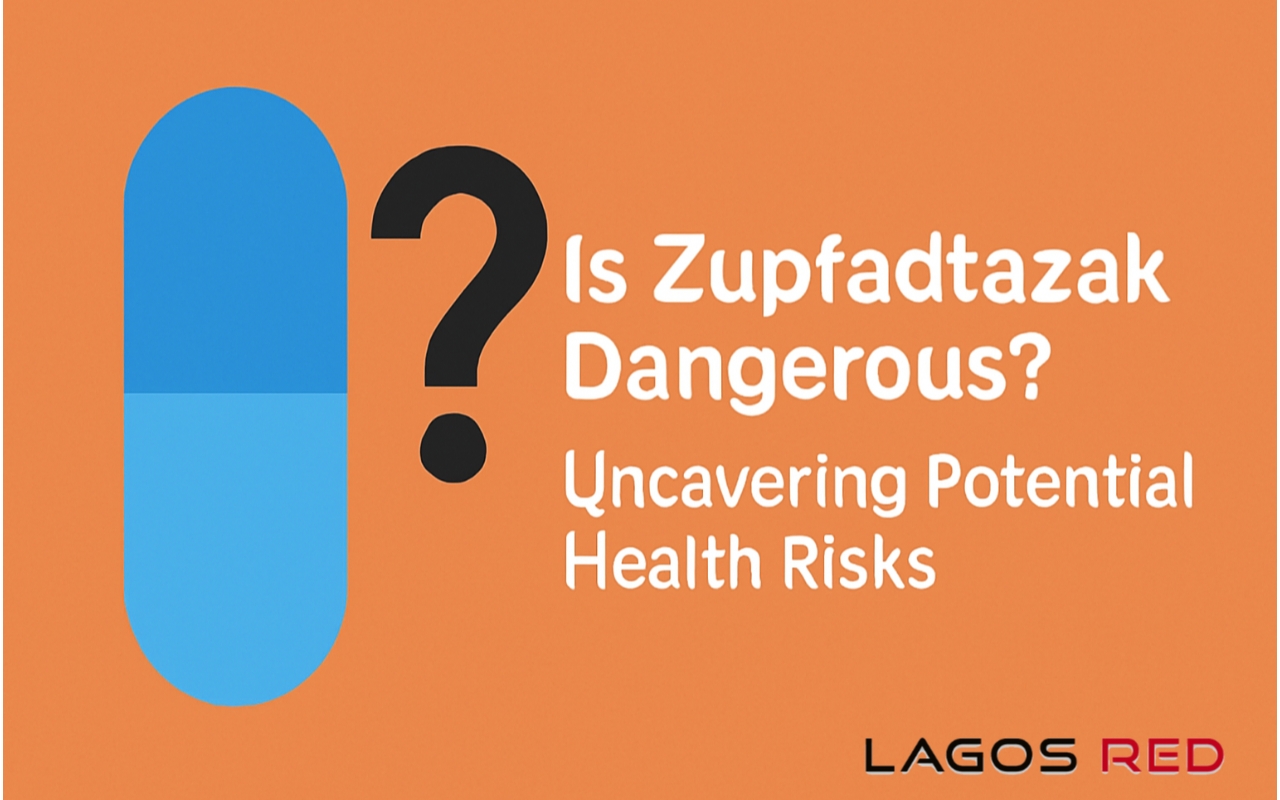Introduction
In the world of health supplements and online discussions, certain terms quickly gain popularity, often based on mysterious or unverified claims. One such term that has recently emerged across various digital platforms is “Zupfadtazak.” While it might sound like just another buzzword or the latest viral health product, the reality is that very little is known about Zupfadtazak. Despite its growing presence in online communities, there is a lot of ambiguity surrounding its actual nature, origin, and potential health effects. This raises a critical question: Is Zupfadtazak dangerous?
This article seeks to unravel the mystery behind Zupfadtazak, exploring its unknowns, assessing potential health risks, and providing you with reliable, science-based information. We will examine its possible risks, its unverified status in the health industry, and why caution should be exercised when encountering such unregulated products.
What Is Zupfadtazak?
Zupfadtazak is a term that has been circulating through various social media platforms, such as Reddit, TikTok, and Instagram, sparking intrigue and speculation. However, despite its increasing presence in digital discussions, there is no verified scientific or medical definition available to the public. This substance does not appear in any recognized pharmacological databases, medical journals, or research publications. Furthermore, there is no mention of Zupfadtazak in the official listings of health regulatory authorities, such as the U.S. Food and Drug Administration (FDA) or the World Health Organization (WHO).
The lack of concrete information about Zupfadtazak leaves room for confusion. Is it a drug? A supplement? Or perhaps a synthetic compound designed to enhance certain bodily functions? The truth is, no one can definitively say. The only thing that is clear is that it is an unverified substance, and any claims made about it, whether positive or negative, cannot be validated by scientific studies or clinical trials. As a result, it’s essential to approach the term with skepticism, especially when it comes to claims made on non-reputable platforms or anonymous sources.
The Rise of Zupfadtazak in Online Communities
The internet is a breeding ground for viral trends, many of which have no basis in science. Zupfadtazak’s sudden rise can be traced to online communities, particularly on platforms like Reddit, where users often share personal anecdotes and speculate on health-related topics. Some individuals claim to have used Zupfadtazak with positive outcomes, such as improved cognitive function, enhanced energy levels, or better physical performance. Others warn of adverse reactions, citing experiences of headaches, dizziness, or gastrointestinal distress. These anecdotal reports, however, lack clinical validation and are highly subjective, making it difficult to draw any meaningful conclusions.
The issue with substances that gain popularity online without any scientific backing is the ease with which misinformation spreads. People may start using Zupfadtazak based on a single favorable review or viral post, assuming it is safe because it has been shared widely, but the truth is that most viral health trends are untested and unregulated. As more users try it and share their experiences, the substance becomes even more ingrained in the digital narrative, leading to further speculation and confusion about its safety.
Health Risks Associated with Unverified Substances
One of the primary concerns when it comes to substances like Zupfadtazak is the complete lack of information regarding their safety profile. Health professionals and researchers rely on peer-reviewed clinical trials to understand the risks associated with new substances. Without this scientific validation, users are left vulnerable to a variety of potential health risks. Some of the risks associated with unverified substances like Zupfadtazak include:
- Allergic Reactions: When it comes to unverified substances, the risk of allergic reactions is significant. Without a full ingredient list or knowledge of the substance’s composition, users may unknowingly be exposed to allergens, which can cause reactions ranging from mild rashes to severe anaphylaxis, a life-threatening condition that requires immediate medical attention.
- Toxicity: The absence of quality control means that substances may contain harmful additives, contaminants, or toxic compounds. Over time, the accumulation of these substances in the body could lead to toxic effects, potentially damaging vital organs or disrupting metabolic processes.
- Medication Interactions: Many individuals take prescription medications to manage chronic conditions or illnesses. Introducing an unverified substance like Zupfadtazak into the mix could lead to harmful interactions between the substance and prescribed drugs. These interactions may either diminish the effectiveness of medications or, worse, amplify their side effects.
- Lack of Dosage Guidelines: Another danger of using unverified substances is that there is no established dosage or safety guidelines. Taking too much of a substance can lead to overdose, which may have serious consequences for health. Without knowing the appropriate amount to consume, users are at risk of causing harm to themselves through irresponsible use.
Given the inherent risks of using substances with no clear safety profile, it is crucial to err on the side of caution and avoid any product that lacks transparency and scientific validation.
Regulatory Oversight and Legal Status
One of the most concerning aspects of Zupfadtazak is its complete lack of regulatory oversight. Products that are approved for public use, whether they are pharmaceuticals, supplements, or food products, go through rigorous testing and evaluation by regulatory bodies like the FDA or the European Medicines Agency (EMA). These agencies ensure that products are safe, effective, and free from harmful substances before they are sold to consumers.
However, Zupfadtazak has not undergone any form of such evaluation. Without regulatory approval, there are no guarantees about the purity or safety of the product, nor is there any legal protection for consumers who experience adverse reactions. In fact, the use of unregulated substances can lead to legal and health complications, as manufacturers are not held accountable for the quality of their products.
This lack of oversight also means that products containing Zupfadtazak may be marketed with exaggerated claims of effectiveness, often without any scientific evidence to back them up. As such, consumers are at risk of being misled by misleading advertising, which is common in the supplement and wellness industry.
Expert Opinions on the Use of Unverified Substances
Healthcare professionals universally agree that the use of substances that have not been rigorously tested in clinical settings is highly risky. Dr. Naomi Wu, a well-known toxicologist and health researcher, states, “The lack of verified safety data means we are essentially gambling with our health. What we know for sure is that many substances that were once deemed safe turned out to be dangerous once proper research was done. We simply can’t afford to take such risks, especially when it comes to our long-term health.”
Dr. Wu’s concerns are shared by other experts in the field of pharmacology and toxicology, who emphasize the importance of scientific research in determining the safety of health products. Substances that have undergone clinical trials are carefully tested for their effects, both positive and negative, and the results are published in reputable journals. This process allows healthcare professionals to make informed recommendations to patients, reducing the risk of adverse outcomes. Without this data, substances like Zupfadtazak remain an unknown quantity, and their use should be avoided.
The Importance of Scientific Validation
Scientific validation is a critical component of the healthcare and wellness industries. Before any product is released to the market, it must undergo thorough testing to ensure that it is safe for use. These tests, often in the form of randomized controlled trials (RCTs), are conducted by researchers and healthcare professionals who evaluate the product’s effects, its safety profile, and its potential side effects.
Without such validation, there is no way to guarantee that a product is safe or effective. This is why healthcare professionals recommend that consumers rely on products that have been proven through research, rather than those that are based solely on internet trends or anecdotal evidence. Zupfadtazak, lacking scientific validation, falls into the category of products that should be avoided until more information becomes available.
Safer Alternatives for Cognitive and Physical Enhancement
If you are looking for cognitive or physical enhancement, there are several proven, safe, and effective alternatives available. These options have undergone rigorous scientific testing and have established safety profiles. Some of the most widely used and researched substances include:
- Omega-3 Fatty Acids: Found in fish oil, omega-3 fatty acids have been shown to improve brain function, enhance memory, and reduce the risk of cardiovascular diseases. Numerous studies have proven their benefits, making them one of the safest and most effective supplements for cognitive health.
- L-Theanine: L-Theanine is an amino acid found in green tea that promotes relaxation and improves focus without causing drowsiness. Research has shown that L-Theanine can reduce stress levels, improve cognitive function, and enhance attention.
- Bacopa Monnieri: Bacopa Monnieri is a herb used in traditional Ayurvedic medicine to enhance memory, reduce anxiety, and improve cognitive function. Clinical studies have confirmed its ability to enhance memory retention and cognitive performance.
These substances have been studied extensively and offer a much safer and more reliable option for those seeking cognitive or physical enhancement, unlike Zupfadtazak.
Conclusion: Proceed with Caution
The emergence of Zupfadtazak, a mysterious and unverified substance, raises significant concerns regarding health and safety. While it may have been popularized online, the lack of scientific research and regulatory oversight means that its true effects remain unknown. The risks associated with using Zupfadtazak include allergic reactions, toxicity, medication interactions, and the absence of reliable dosage guidelines.
Given the current lack of information, it is advisable to avoid using Zupfadtazak and to consult with healthcare professionals before considering any new substance or supplement. Until more data becomes available, it is best to rely on products that are well-established, backed by clinical research, and approved by regulatory authorities.
Your health is too valuable to gamble on unverified products. Stay safe, stay informed, and always make health decisions based on reliable, science-based information.



